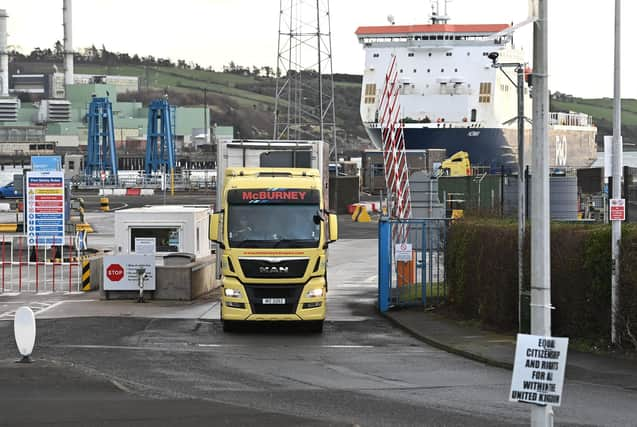Owen Polley: Propagandists for the Northern Ireland Protocol are taking no break for Christmas


But the repercussions of this disgraceful deal don’t stop emerging for the festive season, and neither does the propaganda from the grifters who justify and support the Irish Sea border.
Take the latest figures on the local economy that were published last week.
Advertisement
Hide AdAdvertisement
Hide AdThe Department of the Economy trailed their release by noting that this data should be treated with caution. Its press release said that, “The Covid-19 pandemic had a major impact on the economy during 2020, due to (i) lockdown measures being introduced to mitigate its spread and (ii) prolonged periods of business closures. This should be borne in mind when considering the change in trade estimates between 2020 and 2021.”
It went on to say, “When the figures are viewed in the broader picture of trends observed over the past number of years, the 2021 figures broadly align with what might reasonably have been expected were it not for the impact of the pandemic in 2020.”
That didn’t stop pro-EU politicians, journalists and commentators from implying, or claiming outright, that the protocol improved Northern Ireland’s trade figures.
Some parts of the media focussed on the fact that Northern Irish businesses bought a higher value of goods and services from the UK mainland last year. This was presumably supposed to disprove the theory that, because there are new barriers to trade between GB and NI, many companies either raised their prices to ship goods to Northern Ireland, or decided to stop serving our market altogether.
Advertisement
Hide AdAdvertisement
Hide AdAs the University of Ulster’s painstakingly thorough senior economist, Professor Esmond Birnie, explained, this was by no means the case. “It could be that NI businesses are buying the same volume of goods from GB at a higher cost per unit,” he told the News Letter.
In other words, if the price of buying goods from the mainland were increasing, it is exactly this kind of change you would expect to see.
These statistics don’t cover consumer spending either. The pro-protocol brigade can churn out their distortions and misrepresentations, but people know very well that products have disappeared from supermarket shelves, or cannot be bought online, and that represents a decrease in choice.
In any case, as Prof Birnie explained, another report, published by Barclays Bank, revealed that £1.2 billion worth of goods are currently sitting unfinished in Northern Irish warehouses, due to “supply chain issues”. The authors did not attribute this to the protocol, claiming that they hadn’t “dived specifically into issues faced in Northern Ireland,” but the problem is worse in this region, so it cannot be explained purely by reference to the war in Ukraine, issues in China and other problems that affect the whole UK.
Advertisement
Hide AdAdvertisement
Hide AdOne of the most important points, and one that is consistently ignored, is that the protocol is not yet fully in place, though the EU is suing the government for its rigorous implementation. The flow of goods across the Irish Sea has been maintained, largely, because ministers in Westminster extended ‘grace periods’ for food, parcels and other goods unilaterally.
The government also spent £340 million on a Trader Support Scheme that helped businesses fill in customs declarations and other paperwork. When this assistance comes to an end, and the haulage industry has received briefings indicating that this is imminent, companies will have to pay these costs themselves.
The idea that the protocol provides Northern Ireland with unique opportunities is a swindle and a confidence trick. The danger is that, by the time it is exposed, the Irish Sea border will be so well established, and businesses will have adjusted their focus toward the Republic and Europe so drastically, that the damage inflicted on our economy, our society and our place in the Union will be irreversible.
In the real world, rather than on Planet Protocol, businesses are five times more dependent on Great Britain than southern Ireland for materials and services. 1
Advertisement
Hide AdAdvertisement
Hide AdThe volume of goods that we’ve sold to the Republic increased, but that is probably due to trade diversion, because it’s more difficult for Irish firms to buy British goods.
We still sell almost three times more to mainland UK than to the rest of the island.
On Thursday, while nationalists were still trying to bend these figures to suit their purposes, a judge decreed that unionists in the executive were legally obliged to implement the provisions of the protocol, in a case that involved former agriculture minister, Edwin Poots.
As Rishi Sunak hinted on his visit last week, in the new year, the pressure on the DUP to restore power-sharing is likely to increase; particularly if the government reaches an agreement with the EU to make cosmetic changes to the Irish Sea border. Just as supposedly neutral journalists presented the trade figures in a way that suited the protocol’s advocates, they will continue to tacitly encourage the idea that all Northern Ireland’s problems are rooted in its lack of functioning government.
Advertisement
Hide AdAdvertisement
Hide AdIt is unfortunate for unionists, but the protocol remains an issue so serious that it is existential.
If it is allowed to persist without drastic and meaningful changes, this virus will continue to eat away at the Union until it becomes impossible to explain how 1we can accurately be described as being in the same political and economic unit as the rest of the United Kingdom.